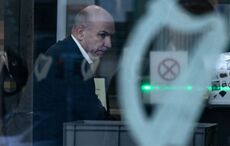“Men and women, all over the world, right down the centuries, come and go. Some leave nothing behind, not even their names”
~ Nelson Mandela
In June of this year, I wrote of news that Nelson Mandela was gravely ill. Reports poured out of Pretoria, South Africa that he was on life support. Then 94, frail and nearing the end of his life, I could still only see in my mind's eye, Mandela at the beginning of his journey, Mandela the free man who stepped onto the world's stage in 1990 after spending 27 years behind bars.
In the darkest days of apartheid, no one - other than Mandela himself - could have imagined the man in that cell as the future President of his country, that he would one day stand among rock stars and royalty and popes and presidents to advocate for democracy and justice, to inspire a vision of peace that transcended race and creed, that he would matter to so many people and that he would make so many people matter. People like me.
Mandela mattered to me because he represented what could be. Like Martin Luther King's dream of what America could be and like the peace once envisioned for Northern Ireland by Betty Williams and Mairead Corrigan, Mandela's vision of South Africa as a democratic rainbow-nation inspired the first all-race democratic election, moving more than 17 million black South Africans to vote for the first time. Such a sight to behold, even on a television screen on the other side of the world - a reminder that anything can happen, that Seamus Heaney's hope and history can rhyme.
In 1987 before I emigrated to the United States, I went to see Paul Simon's Graceland tour in Dublin. The boisterous and beautiful performance sparkled on stage and sparkles still in my memory as one that transcended the ugliness of apartheid. Simon had been and is still widely criticized for performing in South Africa, but how I can fault him for accepting an invitation from black South African musicians to collaborate on some of the most hopeful and uplifting music ever created. Surely, that glorious music represented the "days of miracle and wonder" that were possible in the heart of Nelson Mandela or, years earlier, in the universal dreams of Martin Luther King. In accepting a Grammy award for the album, Simon said of his fellow musicians and friends:
They live under one of the most oppressive regimes on earth today, and still they are able to produce music of great power, nuance and joy, and they have my respect for that.
He was also one of the first people Mandela invited to South Africa. I imagine the smile spreading across Mandela's face, showing he was no longer in prison, not merely because the bars had been removed, but because he had left bitterness and rancor behind. Not everyone did. The late former British Prime Minister Margaret Thatcher had deemed Mandela a terrorist, speaking for most of her party. I remember well, when the Iron Lady took office, her strident refusal to enforce sanctions on apartheid while much of the world was doing so. Her policy of “constructive engagement” with the country’s white minority government polarized her such that when she died recently, there were reports of only a few tears shed in South Africa. As young university students in 1984, we were singing along with The Specials urging those who could to "Free Nelson Mandela."
How could we not? His release was a moral imperative, the right thing to do against a racist regime. We were young and full of hope for a better future, and through that lens, we saw Thatcher and others in her party as resolute in their support of white rule which seemed only to prolong Mandela's imprisonment in that tiny cell.
On the other side of the argument, there were those, including De Klerk, who felt that "Thatcher correctly believed that more could be achieved through constructive engagement with his government than international sanctions and isolation of the South African government." The truth lies somewhere in the middle, as it always does.
When Mandela walked out of jail, a joyous crack was heard all over the world. While enormous challenges lay ahead with, unthinkably, more blood spilled, eventually, apartheid would be taken down and De Klerk and Mandela, together, would rise up to be honored with the Nobel Prize for Peace for their shared vision of a South Africa without apartheid, a democratic nation, an example for other countries beleaguered by bigotry and bitterness, proof positive that it is possible to sustain humanity in a world defined by brutal divisiveness.
Amnesty International's Ambassador of Conscience Award inspired by fellow Nobel Laureate, Seamus Heaney's "From the Republic of Conscience," was presented to Mandela in 2006. Perfect then that Heaney would be the first to congratulate Mandela thus:.
"To have written a line about 'hope and history' rhyming for Mr. Mandela in 1990 is one thing . . . to have the man who made them rhyme accept the Award inspired by my poem is something else again."
Back in June, I imagine Seamus Heaney was vexed over the thought of a world without Mandela. I think we all were. I remember my husband and I talking about his charisma, the "Madiba magic" that changed the world. We were sad that Mandela's time with us was coming to an end, and I remember turning to the poetry of Seamus Heaney, the way I always do in times of sorrow.
And now, just six months later, I am writing that Nelson Mandela is gone. Seamus Heaney is gone. My husband is gone. Gone. All three like shooting stars.
If I didn't know better, I'd say it feels like the world might end.
"From the Republic of Conscience" by Seamus Heaney
When I landed in the republic of conscience
it was so noiseless when the engines stopped
I could hear a curlew high above the runway.
At immigration, the clerk was an old man
who produced a wallet from his homespun coat
and showed me a photograph of my grandfather.
The woman in customs asked me to declare
the words of our traditional cures and charms
to heal dumbness and avert the evil eye.
No porters. No interpreter. No taxi.
You carried your own burden and very soon
your symptoms of creeping privilege disappeared.
II
Fog is a dreaded omen there but lightning
spells universal good and parents hang
swaddled infants in trees during thunderstorms.
Salt is their precious mineral. And seashells
are held to the ear during births and funerals.
The base of all inks and pigments is seawater.
Their sacred symbol is a stylized boat.
The sail is an ear, the mast a sloping pen,
the hull a mouth-shape, the keel an open eye.
At their inauguration, public leaders
must swear to uphold unwritten law and weep
to atone for their presumption to hold office –
and to affirm their faith that all life sprang
from salt in tears which the sky-god wept
after he dreamt his solitude was endless.
III
I came back from that frugal republic
with my two arms the one length, the customs woman
having insisted my allowance was myself.
The old man rose and gazed into my face
and said that was official recognition
that I was now a dual citizen.
He therefore desired me when I got home
to consider myself a representative
and to speak on their behalf in my own tongue.
Their embassies, he said, were everywhere
but operated independently
and no ambassador would ever be relieved.
Read more: Ireland’s leaders mourn the death of South African hero Nelson Mandela (VIDEO)




Comments